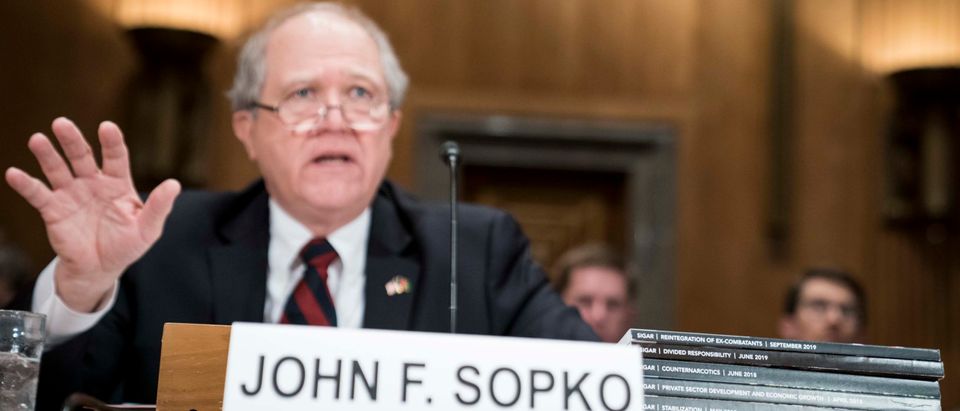Department of Defense (DOD) officials did not appear to discuss a watchdog report warning of the Afghan Air Force’s guaranteed collapse if the U.S. withdrew its forces from Afghanistan, according to documents obtained exclusively by the Daily Caller News Foundation.
The Center to Advance Security in America (CASA) in 2022 filed a public records request seeking copies of Pentagon officials’ communications discussing a January 2021 Special Inspector General for Afghanistan Reconstruction (SIGAR) report that warned the Afghan Air Force relied too heavily on American contractors and, therefore, would collapse without U.S. presence in the country. However, documents obtained by the DCNF provided by the Pentagon in response to the request did not reference the report at all — even though its predictions proved accurate following the U.S. military withdrawal in August that year.
The U.S. troop withdrawal concluded in August 2021 as Taliban forces rapidly conquered Afghan territory and closed in on the capital of Kabul. The total collapse of the Afghan security forces and inability of the country’s air force to assume roles previously filled by U.S. aerial assets led to the Taliban’s total takeover, The Associated Press reported shortly after the report was declassified.
In the report, SIGAR warned that the Afghan Air Force could not operate without continued training, maintenance and financial aid and was still overly dependent on external contractors.
SIGAR did not declassify the report until January 2022, a year after its initial publication, according to the report.
CASA obtained the records via a Freedom of Information Act (FOIA) request. The documents — only 11 pages, some duplicated — span the time period from when SIGAR provided the then-classified report to the Pentagon to the date of the FOIA request in January 2022, the request shows. (RELATED: Biden Thinks ‘Nobody Made A Mistake’ During Afghanistan Withdrawal, New Book Claims)
CASA asked for “all communications within and between DOD personnel pertaining to this SIGAR report,” including guidance for public relations strategies, and engagement with outside federal agencies over the report.
Most of the records CASA obtained made brief reference to SIGAR’s January 2021 Quarterly Report, not the report discussing the Afghan Air Force (AAF). Others discussed a European Union statement condemning kidnapping and destruction of property. Individuals on an email chain — then-DOD spokesperson John Kirby, Chief of Staff Kelly Magsamen and then-special military assistant Lt. Gen. Bryan Fenton — worried about the public response to data in the quarterly report noting that U.S. strikes rose for the second quarter in a row.
“The Pentagon’s own responsive documents show that there was no meaningful discussion of the SIGAR report. America put two decades, 2,000 American lives and billions of dollars into the Afghan War, and it’s troubling to think that it was ended as it was without considering every bit of intelligence available, including reports from the Special Inspector General,” CASA Director James Fitzpatrick said in a statement.
Since 2010, the U.S. government had provided $8.5 billion to the Afghan Air Force and Special Mission Wing with the goal of helping them become self-sustainable, SIGAR wrote in the introduction to the report. Significant progress had been made over the ensuing decade in pilot training and operational capacity, but the air force continued to rely heavily on outside contractors to provide the actual instruction to pilots and equipment maintainers.
SIGAR’s new Lessons Learned report, What We Need to Learn: Lessons from Twenty Years of #Afghanistan Reconstruction, examines the past two decades of the U.S. reconstruction effort in Afghanistanhttps://t.co/59SOd9qCML pic.twitter.com/iPeZtok50Q
— SIGAR (@SIGARHQ) August 17, 2021
U.S. advisers believed neither the AAF and the Afghan military’s Special Mission Wing (SMW) had “the ability to sustain themselves without continued advisor and [contractor logistic support] assistance,” according to SIGAR.
But contractors would likely leave if U.S. forces were no longer present to provide security, the report stated.
“The potential withdrawal of contractors from Afghanistan, in addition to U.S. and Coalition forces, may leave the AAF and SMW without the necessary support to sustain and develop the Afghan air forces, if alternative sources are not identified,” the report stated. “Sustainable Afghan air forces requires more from the Afghans than simply providing pilots and aircrew to be trained by the U.S. government for combat missions on airframes purchased and maintained by the U.S. government. The U.S. and Afghans’ lack of focus on the non-combat support activities … risks the development of independent, self-sustained Afghan aviation capability.”
“Further, the potential absence of both military advisors and contractors before the AAF and SMW are able to staff, manage, fund, or maintain their forces puts at risk the entire U.S. investment in the Afghan air forces,” SIGAR wrote.
Afghan aircraft continued to strike Taliban positions through July of 2021, but were unable to block the Taliban’s forward progress, according to the AP. Afghan officials had also warned that warplanes were low on ammunition and most could not get off the ground.
Train, Advise, Assist Command–Air (TAAC-Air), an organization made up of U.S. and NATO personnel and U.S. contractors, responded that it was developing a mitigation plan in the event of a U.S. withdrawal to ensure support to the AAF would continue without the protection of U.S. troops, comments included in an appendix to the report show. It was unclear whether the plan was implemented or completed prior to the withdrawal that August.
The Pentagon did not immediately respond to the DCNF’s request for comment.
All content created by the Daily Caller News Foundation, an independent and nonpartisan newswire service, is available without charge to any legitimate news publisher that can provide a large audience. All republished articles must include our logo, our reporter’s byline and their DCNF affiliation. For any questions about our guidelines or partnering with us, please contact licensing@dailycallernewsfoundation.org.


